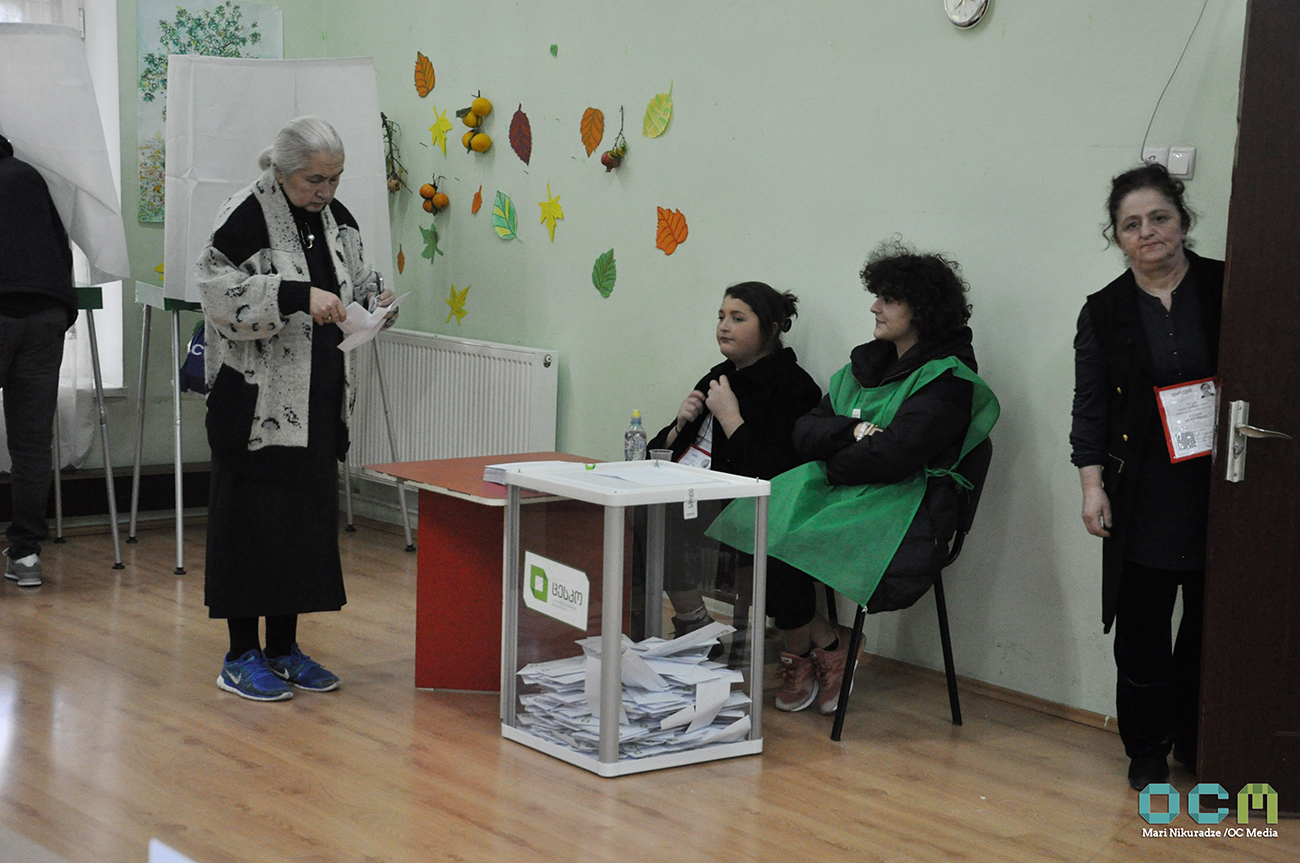
Georgia’s Justice Minister Tea Tsulukiani has accused three leading Georgian transparency groups of lying over accusations the government may be planning to rig 28 November’s presidential run-off election.
‘It is very unfortunate that three non-governmental organisations — to call everything by its name — were caught in a lie’, Tsulukiani told journalists on Thursday.
Transparency International — Georgia, the Georgian Young Lawyers’ Association (GYLA), and the International Society for Fair Elections And Democracy (ISFED) announced in a joint press conference on Tuesday that they had received information suggesting the authorities were printing fake ID cards to affect the outcome of the election.
The groups claimed to have received the information from a whistleblower in the Public Service Development Agency (PSDA) under the Justice Ministry, which is responsible for issuing identity documents.
The Justice Minister speculated that the groups may have been ‘victims’ of misinformation fed to them by the opposition United National Movement Party (UNM). She said the opposition might have needed a ‘non-governmental mouthpiece’ to make claims of election fraud.
Tsulukiani urged the Prosecutor’s Office to continue to investigate the allegations despite unspecified ‘attempts to make the story go away’.
The ruling Georgian Dream party’s General Secretary, Kakha Kaladze, urged ‘all to act more responsibly and instead of making unsubstantiated accusations, to provide the prosecution with information based on factual materials, so that there are no questions about the information as well as about the purpose of spreading that information’.
ISFED chair Mikheil Benidze and the head of TI-Georgia, Eka Gigauri, both criticised Tsulukiani’s allegations in comments to IPN. They called her speculation that the information was false unacceptable given that the investigation was still underway.
‘Not cooperating’
Criticism from the ruling party came immediately after the groups refused to reveal the identity of the whistleblower.
On Wednesday, after taking statements from the heads of all three groups, the Prosecutor’s Office announced that they ‘did not cooperate with the investigation’.
Specifically, the prosecution said that Eka Gigauri of TI-Georgia and Irma Pavliashvili of GYLA did not share the identity of the source or information about an alleged meeting to discuss the scheme.
Referring to Articles 75 and 76 of Criminal Procedure Code, the authorities underlined that they could not consider their indirect testimonies as admissible evidence without also identifying the source as a primary witness.
They said their decision to withhold the whistleblower's identity represented the ‘refusal of a witness to voluntarily provide information to the prosecution’.
According to Georgia’s Criminal Code, ‘indirect testimony shall be considered admissible evidence only if the person giving indirect testimony refers to the source of information that can be identified and the real existence of which can be established’.
The code also says that ‘testimony of a witness may not be considered evidence, unless the witness is able to point out to the source of information’.
The heads of all three groups refused to name the whistleblower citing their wish to protect him or her, despite the prosecution’s offer to place the source in a witness protection programme.
After visiting the Prosecutor’s Office, Gigauri said that they provided the prosecution with the location and the names of the participants of the meeting that the source alleged to have taken place in order to prepare the scheme.
She said it was the duty of the authorities to investigate this, not theirs.
Prosecutor Amiran Guluashvili, who is investigating the case, stated on Wednesday that they planned to question ‘all individuals’ they had information could possibly be involved in the case.
‘Trustworthy people’
In their joint press conference on Tuesday TI-Georgi, GYLA, and ISFED outlined what a whistleblower ‘within the agency’ allegedly told them was a scheme to swing the run-off of presidential elections on 28 November in favour of Salome Zurabishvii, the embattled candidate endorsed by Georgian Dream.
In the first round, Zurabishvili narrowly defeated the opposition United National Movement’s (UNM) Grigol Vashadze, winning 39% votes to 38%
According to the claim, the PSDA was to print five fake ID cards with different names for the same people. These people would then fraudulently cast ballots in several election precincts on election day.
They claimed the whistleblower had told them the PSDA had already temporarily replaced the heads of several territorial branches they considered ‘untrustworthy’ with people they trusted to execute the fraud.
The list of people allegedly not considered trustworthy included Arkadi Pipia, head of the Tsalenjikha branch and Zurab Khvedelidze, head of the Gardabani branch. The groups claimed that Pipia had confirmed to them he was on vacation.
Pipia was questioned by the Prosecutor’s Office on Thursday, after which he told the media he had been away from his office in Tsalenjikha due to a ‘retraining’ programme.
According to the groups, their source had identified the head of the PSDA, Soso Giorgadze, and the head of its internal audit service as being in charge of printing the fake ID documents.
On Tuesday, in an emotional press briefing, Giorgadze called the allegations ‘outrageous’ and ‘offensive’ to his office. He told journalists he had already referred the matter to Justice Ministry’s internal inspection department.
Soon after Giorgadze’s press briefing, the Prosecutor’s Office said they were investigating the case.




 22 November 2018
22 November 2018


